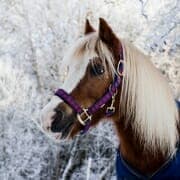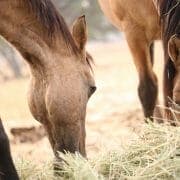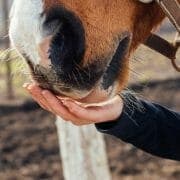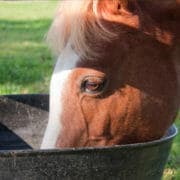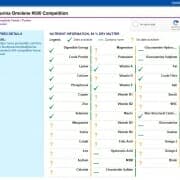Alfalfa (Lucerne) Hay: Friend or Foe?
Also known as lucerne in some parts of the world, alfalfa hay enjoys a varied reputation amongst horse people, with some using it as a highly valued component of their horse’s diet and others avoiding it with almost religious fervour. So, who is right? Is alfalfa hay a suitable forage for horses? Or are there other more suitable forages? The answer is yes, and yes. Alfalfa hay is a valuable forage for horses when fed to the right classes of horses and in the correct amounts for its full benefit to be realised. The following article looks at the nutrients contained in alfalfa hay and its many and varied uses in the horse industry.
Nutrient profile
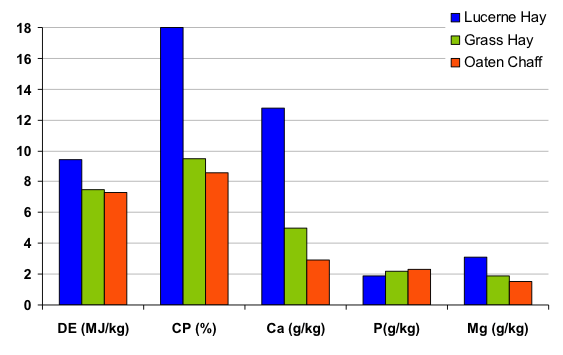
Figure 1: A comparison of the digestible energy (DE), crude protein (CP), calcium (Ca), phosphorous (P) and magnesium content of early bloom lucerne hay, grass hay and oaten chaff.
Good quality alfalfa hay contains more protein and energy than grass or cereal hays and chaffs (Figure 1). Alfalfa also contains high concentrations of calcium and magnesium, and when fresh, the vitamins A and E. Alfalfa is typically low in phosphorous and depending on where it was grown, contains varying concentrations of other micro and macro minerals. The protein in alfalfa hay is of high quality and contains appreciable amounts of the essential amino acid lysine.
When to feed alfalfa to horses?
To answer that question, we must consider the strengths and weaknesses of alfalfa hay. Firstly, note that there are no known anti‐nutritive factors in alfalfa hay. It is a very high quality, safe feed. However, the higher energy and protein in alfalfa hay can result in too much energy and/or too much protein in the horse’s diet if you feed too much, so it is important to keep these nutrients in the diet within the recommended daily intake limits (RDI’s). Too much protein and/or energy can result in some problems for horses which are discussed below. As with all hays, some nutrients are lacking, particularly some of the trace‐minerals, so when feeding alfalfa hay it is important to ensure you are meeting the RDI’s when balancing your horse’s diet. The use of alfalfa hay in the diet of various classes of horses is discussed below:
1. Performance horses in training and competition
Alfalfa hay can be used to provide energy, good quality protein and a source of fibre to the diet of a performance horse; however, it must be used in moderation. Excess protein in the diet of working horses and particularly those that are stabled can be detrimental to their health and performance. Excess protein intake will increase urinary ammonia production, which may then result in respiratory problems for horses confined to a stable. Excess protein can also contribute to dehydration due to water loss through increased urine production and excretion and increases the amount of heat produced during the digestion and utilisation of feedstuffs. Therefore a diet containing protein in excess of the horse’s requirement can increase the horse’s water and electrolyte loss through sweating and can contribute to hyperthermia, and decreased performance or endurance capacity.
It is important to understand that these effects are not as a direct result of feeding alfalfa, but rather from feeding too much alfalfa. Avoid them by keeping protein within the RDI limits. Use a grass or cereal hay to supply some of the horse’s roughage/fibre requirement.
2. Spelling or idle horses
Alfalfa hay can play a role in the spelling or idle horse’s diet and will provide these horses with good quality protein and calcium. If you keep energy and protein within your horse’s RDI, you can safely feed alfalfa to your horse on stall rest without having excess weight gain due primarily to too much energy.
<strong>3. Ponies</strong>
Ponies may be safely fed alfalfa hay, but again it must be fed in moderation. Alfalfa hay, because of its highly digestible nature is capable of encouraging significant weight gain in ponies, particularly those that are easy keepers. Feeding too much alfalfa hay may therefore predispose ponies to laminitis, as the risk of laminitis increases when ponies become overweight (again, this is not as a result of feeding alfalfa, but as a result of feeding too much energy and protein which in turn leads to excess weight gain). Keep energy and protein within the recommended daily limits when using alfalfa in the diets of ponies.
Alfalfa hay is very useful in the diet of aged ponies. As horses and ponies age, they lose some ability to digest fibre and protein. Feeding them an easily digested fibre and high quality protein source in the form of alfalfa hay will help them maintain bodyweight, particularly in winter.
4. HYPP and laminitic horses
Alfalfa hay may not be suitable for horses suffering with hyperkalaemic periodic paralysis (HYPP) as its concentration of potassium is often quite high (14 – 25+ g/kg). Make sure you keep potassium in particular at the 100% RDI in these horses, regardless of the feeds you use.
In the reverse, and contrary to popular opinion, alfalfa hay is a very suitable feedstuff for horses that have suffered a bout of laminitis. The high quality protein in alfalfa hay will help the horse to repair its damaged laminae while the energy derived from the alfalfa will prevent these horses from entering a negative energy balance which slows or prevents the hoof’s healing process taking place. In comparison to some grass hays, alfalfa also contains a lower level of starches and sugars. Again, make sure you feed alfalfa hay in moderation to prevent excess weight gain; don’t exceed the energy and protein RDI’s in FeedXL.
5. Growing Horses
Alfalfa is a valuable forage in the diet of growing horses. Alfalfa provides growing horses with a digestible source of energy as well as a source of high quality protein and the essential amino acid lysine. Alfalfa’s calcium rich characteristic is also beneficial for growing horses that typically have high calcium requirements.</p>
However, when feeding alfalfa to growing horses, the amount fed should not exceed the growing horse’s energy requirements. Growing horses fed energy in excess of their RDI’s have a much higher chance of suffering from developmental orthopaedic diseases including osteochondritis dissecans (OCD).
Feeding protein in excess of the growing horse’s protein requirements does not appear to be detrimental as the protein can be utilised as a source of energy. However, protein is an expensive source of energy and to quote Susan Garlinghouse “it is sort of like using bundles of dollar bills to start a barbeque. It’ll get the job done, but there are much cheaper, easier and more efficient ways of doing it”. Therefore, instead of using alfalfa hay to meet 100% of a growing horse’s energy requirements (which will far exceed their protein requirements) it would (depending on pasture conditions) be more economical to use some form of cereal grain or high energy fibre like sugarbeet pulp or soybean hulls to provide additional energy in the diet when needed.
Another point to be aware of when feeding alfalfa hay to growing horses is their intake of phosphorous. While feeding alfalfa hay to meet a growing horse’s protein requirements will also in most cases meet their calcium requirements, their phosphorous requirements will not be met. Feeding cereal grains will help to increase a growing horse’s intake of phosphorous, however, in many cases, phosphorous supplementation may be required (remembering that the calcium to phosphorous ratio in the diet of a growing horse should be maintained within the range of 1: 1 to 3: 1). Dicalcium phosphate is a suitable source of phosphorous for growing horses.
Also keep in mind that alfalfa hay is not a complete feed and will more often than not contain insufficient concentrations of trace minerals, in particular copper and zinc, to support sound musculoskeletal development. Thus diets utilising alfalfa hay as a protein and energy source must be balanced using an appropriate trace mineral supplement for the best results.
Once again, getting the diet balanced for the nutrient RDI’s in FeedXL is vital to making the best use of alfalfa.
6. Pregnant and Lactating Mares
Alfalfa hay is an exceptional source of energy and good quality protein for pregnant and lactating mares. Alfalfa hay will also help to support these mares’ elevated requirements for calcium and the essential amino acid lysine.
When feeding the pregnant mare alfalfa hay, take care not to exceed her energy requirements since this can cause her to become overweight. Pregnant mares should remain within a body condition score of 5 to 7 (using the Henneke scale of condition scoring) to prevent reduced milk production during the lactation period.
The lactatating mare’s energy requirements however are higher, and alfalfa hay alone will not be capable of meeting these and may, depending on pasture conditions, need to be fed in conjunction with cereal grains or high energy fibres to maintain body condition throughout lactation. Likewise, the lactating mare’s phosphorous and trace mineral requirements will not be met by a diet of alfalfa hay, thus these must also be supplemented accordingly.
As with growing horses, excess protein in the diet of pregnant and lactating mares does not appear to be harmful, however it is an unnecessary waste of this relatively expensive feed component and should be avoided if possible.
In Conclusion
Alfalfa is a valuable feedstuff for horses and is capable of providing them with energy, high quality protein, lysine, calcium and varying levels of other vitamins and minerals. However, alfalfa hay must be used correctly in the diets of all horses to realise its full benefits. Problems with the feeding of excess energy and protein are possible when feeding alfalfa hay so keep a close watch on those energy and protein RDI’s. Use grass/meadow hays in conjunction with alfalfa hay to fulfil a horse’s roughage requirement and well chosen supplements to fulfil mineral requirements. This will help you balance the diet and avoid some of the problems that can be associated with over‐feeding alfalfa hay.
Join FeedXL today and take control of your horse’s nutrition
Get EVEN MORE practical and personalised feeding guidance when you sign up to FEEDXL.
Do you have a question or comment? Do you need help with feeding?
We would love to welcome you to our FeedXL Horse Nutrition Facebook Group. Ask questions and have them answered by PhD and Masters qualified equine nutritionists and spend time with like-minded horse owners. It’s free!
Click here to join the FeedXL Horse Nutrition Facebook Group



